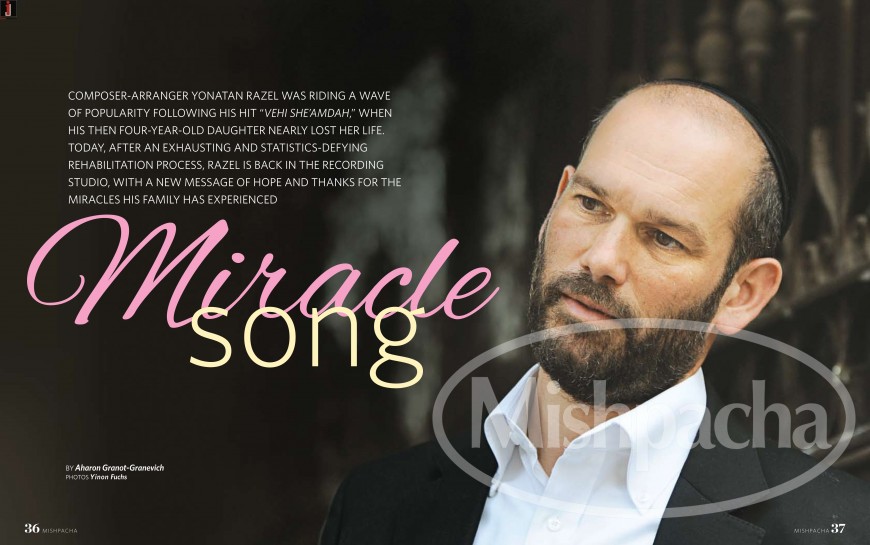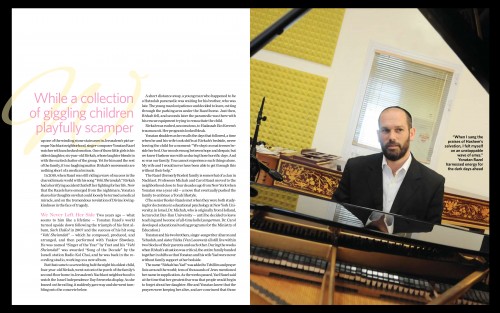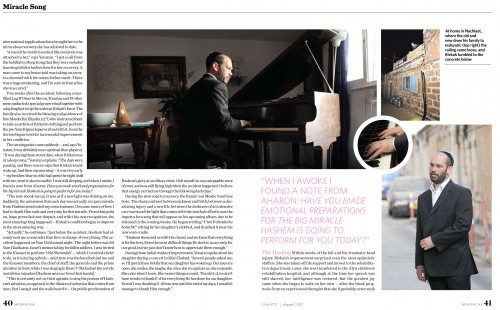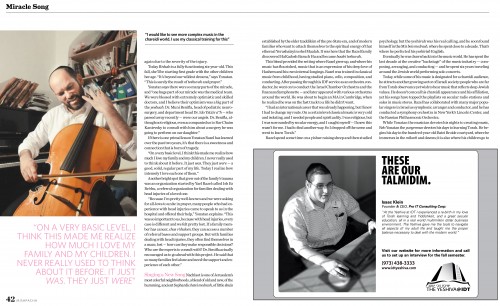Mishpacha Magazine: Yonatan Razel – Miracle Song

Composer-arranger Yonatan Razel was riding a wave of popularity following his hit “Vehi She’amdah,” when his then four-year-old daughter nearly lost her life. Today, after an exhausting and statistics-defying rehabilitation process, Razel is back in the recording studio, with a new message of hope and thanks for the miracles his family has experienced
by Aharon Granot-Granevich
photos Yinon Fuchs
While a collection of giggling children playfully scamper up one of the winding stone staircases in Jerusalem’s picturesque Nachlaot neighborhood, singer-composer Yonatan Razel watches with unchecked emotion. One of those little girls is his oldest daughter, six-year-old Rivkah, whose laughter blends in with the excited chatter of the group. Yet for him and the rest of the family, it’s no laughing matter. Rivkah’s movements are nothing short of a medical miracle.
In 2010, when Razel was still riding a wave of success in the chareidi music world with his song “Vehi She’amdah,” Rivkah had a horrifying accident that left her fighting for her life. Now that the Razels have emerged from the nightmare, Yonatan shares his thoughts on what could loosely be termed a medical miracle, and on the tremendous revelation of Divine loving-kindness in the face of tragedy.
We Never Left Her Side Two years ago — what seems to him like a lifetime — Yonatan Razel’s world turned upside down following the triumph of his first album, Sach HaKol in 2007 and the success of his hit song “Vehi She’amdah” — which he composed, produced, and arranged, and then performed with Yaakov Shwekey. He was named “Singer of the Year” by Ynet and his “Vehi She’amdah” was awarded “Song of the Decade” by the Israeli station Radio Kol Chai, and he was back in the recording studio, working on a new album.
But that came to a screeching halt the night his oldest child, four-year-old Rivkah, went out onto the porch of the family’s second-floor home in Jerusalem’s Nachlaot neighborhood to watch the Israel Independence Day fireworks display. As she leaned on the railing, it suddenly gave way and she went tumbling onto the concrete below.
A short distance away, a young man who happened to be a Hatzolah paramedic was waiting for his brother, who was late. The young man lost patience and decided to leave, cutting through the parking area under the Razel home. Just then, Rivkah fell, and seconds later the paramedic was there with his rescue equipment trying to resuscitate the child.
Rivkah was rushed, unconscious, to Hadassah Ein Kerem’s trauma unit. Her prognosis looked bleak.
Yonatan shudders as he recalls the days that followed, a time when he and his wife took shifts at Rivkah’s bedside, never leaving the child for a moment: “We slept on mattresses beside her bed. Our moods swung between hope and despair, but we knew Hashem was with us during those horrific days. And so was our family. You cannot experience such things alone. My wife and I would never have been able to get through this without their help.”
The Razel (formerly Rosler) family is somewhat of a clan in Nachlaot. Professors Michah and Carol Razel moved to the neighborhood close to four decades ago from New York when Yonatan was a year old — a move that eventually pushed the family to embrace a Torah lifestyle.
(The senior Rosler-Razels met when they were both studying for doctorates in educational psychology at New York University; in Israel, Dr. Michah, who is originally from Holland, lectured at Bar-Ilan University — until he decided to leave teaching and become a full-time kollel yungerman. Dr. Carol developed educational testing programs for the Ministry of Education.)
Yonatan and his two brothers, singer-songwriter Aharon and Yehudah, and sister Ricka (Van Leeuwen) all still live within two blocks of their parents and each other. During the weeks when Rivkah’s situation was critical, the entire family banded together in shifts so that Yonatan and his wife Yael were never without family support at her bedside.
The name “Rivkah bas Yael” was added to Tehillim and prayer lists around the world; tens of thousands of Jews mentioned her name in supplication. As the weeks passed, Yael Razel said at the time that her greatest fear was that people would begin to forget about her daughter. She and Yonatan knew that the prayers were keeping her alive, and are convinced that those international supplications have brought her to the miraculous recovery she has achieved to date.
“Around the world it seemed like everyone was attached to her,” says Yonatan. “I got a call from the kehillah in Hong Kong that they were mekabel learning hilchos lashon hara for her recovery. A man came to my house said was taking on an extra chumrah with his tzitzis for her merit. There was a huge awakening, and I’m sure in that zchus she was cured.”
Two weeks after the accident, following a tear-filled Lag B’Omer in Meron, Yonatan and 19 other men conducted a special prayer ritual together with a daylong fast to tip the scales in Rivkah’s favor. The family also received the blessing and guidance of Rav Mordechai Eliyahu ztz”l, who instructed them to take an article of Rivkah’s clothing and perform the pre-Yom Kippur kaparos ritual with it. Soon the doctors began to notice incremental improvements in her condition.
The turning point came suddenly — and, says Yonatan, it was definitely more spiritual than physical. “It was during those worst days, when Rivkah was in a deep coma,” Yonatan explains. “The days were passing, and there was no sign that Rivkah would wake up. And then one morning — it was very early — my brother Aharon, who had spent the night shift with me, went to daven vasikin. I was still sleeping, and when I awoke I found a note from Aharon: Have you made emotional preparations for the big miracle Hashem is going to perform for you today?
“The note shook me up. It was as if a new light was shining on me. Suddenly, the awareness that each day was actually an open miracle from Hashem penetrated my consciousness. I became aware of how I had to thank Him each and every day for this miracle. From that point on, hope prevailed over despair, and with this new recognition, the most amazing thing happened — Rivkah’s condition began to improve in the most amazing way.
“Actually,” he continues, “just before the accident, Hashem had already sent me a reminder that He’s in charge of everything. The accident happened on Yom Ha’atzmaut night. The night before was leil Yom Hazikaron, Israel’s memorial day for fallen soldiers. I was invited to the Knesset to perform ‘Vehi She’amdah’ — which I received a heter to do, as it’s during sefirah — and there was the band behind me and the Knesset members, the chief of staff, the generals and the prime minister in front, while I was singing to them ‘V’HaKadosh Baruch Hu matzileinu miyadam [Hashem saves us from their hands].’
“This is certainly not on their agenda, to sing the praises of Hashem’s salvation, as opposed to the illusion of salvation that comes from man. But I sang it and the walls heard it — the public proclamation of Hashem’s glory at a military event. I felt myself on an unstoppable wave of emes, and was still flying high when the accident happened. I believe that energy carried me through the following dark days.”
During the slow road to recovery, the Razels’ son Moshe Yosef was born. The sharp contrast between sickness and birth, between a devastating injury and a new life, between the darkness of an intensive care ward and the light that comes with the simchah of birth, was the impetus for a song that will appear on his upcoming album, due to be released in the coming weeks. He began writing “V’ani b’chasdecha batachti” sitting by his daughter’s sickbed, and finished it near his new son’s cradle.
“Hashem showered us with His chesed, and we know that everything is for the best. Even the most difficult things He does to us are only for our good, but we just don’t know how to appreciate them enough.”
During those initial weeks of improvement, Yonatan spoke about his daughter during a concert in Kfar Chabad. “Several people asked me, so I’ll just tell you briefly that our daughter has woken up. Her eyes are open, she smiles, she laughs, she cries, she recognizes us, she responds. She cries when I leave. She moves things around. Thank G-d, we don’t have words to thank G-d for everything He has done for our daughter. Even if I was thanking G-d from now until the end of my days, I wouldn’t manage to thank Him enough.”
The Healing Within weeks of the fall and the traumatic head injury, Rivkah’s improvement surprised even the most optimistic staffers. She was taken off life support and moved to the rehabilitation department. Later, she was transferred to the Alyn children’s rehabilitation hospital, and although at the time her speech was still slurred, her intelligence was restored. But the greatest joy came when she began to walk on her own — after the bleak prognosis from an experienced therapist that she’d probably never walk again due to the severity of the injury.
Today Rivkah is a fully functioning six-year-old. This fall, she’ll be starting first grade with the other children her age. “It’s beyond our wildest dreams,” says Yonatan. “This is surely the result of teshuvah and prayer.”
Yonatan says there were so many parts of the miracle, and “one huge part of our miracle was the medical team. We were blessed with extremely optimistic and skilled doctors, and I believe their optimism was a big part of the yeshuah. Dr. Muni Benifla, head of pediatric neurosurgery, and department head Dr. Ido Yatziv a”h — who passed away recently — were our angels. Dr. Benifla, although not religious, even accompanied us to Rav Chaim Kanievsky to consult with him about a surgery he was going to perform on our daughter.”
If there is one primal lesson Yonatan Razel has learned over the past two years, it’s that there is a sweetness and connection that is born of tragedy.
“On a very basic level, I think this made me realize how much I love my family and my children. I never really used to think about it before. It just was. They just were — a good, solid, regular part of my life. Today I realize how intensely I love each one of them.”
Another bright spot that grew out of the family’s trauma was an organization started by Yael Razel called Ish Es Re’ehu, a referral organization for families dealing with head injuries of a loved one.
“Because I’m pretty well-known and we were asking for all Jews to unite in prayer, many people who had experience with head injuries came to speak to us in the hospital and offered their help,” Yonatan explains. “This was so important to us, because with head injuries, every case is different and we felt pretty lost. If a family member has cancer, chas v’shalom, they can access a number of referral bases and support groups. But with families dealing with head injuries, they often find themselves in a maze, lost — how can they make responsible decisions? Who are the experts to consult with? Dr. Benifla actually encouraged us to go ahead with this project. He said that so many families feel alone and need the support and experience of each other.”
Singing a New Song Nachlaot is one of Jerusalem’s most colorful neighborhoods, a blend of old and new, of the humming, ancient Sephardic batei medrash, of little shuls established by the elder tzaddikim of the pre-State era, and of modern families who want to attach themselves to the spiritual energy of that ethereal Yerushalayim shel Maalah. It was here that the Razel family discovered HaKadosh Baruch Hu and became baalei teshuvah.
This blend provided the setting where Razel grew up, and where his music has flourished, music that is an expression of his deep love of Hashem and his own internal longings. Razel was trained in classical music from childhood, having studied piano, cello, composition, and conducting. After passing through his IDF service as an orchestra conductor, he went on to conduct the Israel Chamber Orchestra and the Raanana Symphonette — and later appeared with various orchestras around the world. He was about to begin an MA in Cambridge, when he realized he was on the fast track to a life he didn’t want.
“I had an international career that was already happening, but I knew I had to change my route. On a certain level classical music is very cold and isolating, and I needed people and spirituality. I was religious, but I was surrounded by secular energy, and I caught myself — I knew this wasn’t for me. I had to find another way. So I dropped off the scene and went to learn Torah.”
Razel spend some time on a yishuv raising sheep and then studied psychology, but the yeshivah was his real calling, and he soon found himself in the Mir beis medrash, where he spent close to a decade. That’s where he perfected his yeshivish English.
Eventually he was drawn back into the music world. He has spent the last decade at the creative “backstage” of the music industry — composing, arranging, and conducting — and he spent six years traveling around the Jewish world performing solo concerts.
Today, while some of his music is designated for a chareidi audience, he attracts another growing sector of Israeli society: people who are far from Torah observance yet wish to hear music that reflects deep Jewish values. He doesn’t conceal his chareidi appearance and his affiliation, yet his songs have topped the playlists on secular radio stations and sales in music stores. Razel has collaborated with many major popular singers in Israel as symphonic arranger and conductor, and he has conducted a symphony orchestra in New York’s Lincoln Center, and the Russian Philharmonic Orchestra.
While Yonatan the musician devotes his nights to creating music, Reb Yonatan the yungerman devotes his days to learning Torah. He begins his day in the hundred-year-old Batei Broide courtyard, where he immerses in the mikveh and davens; it is also where his children go to school. He spends the morning hours in the Jerusalem Kollel in Sanhedria Murchevet, headed by Rav Yitzchak Berkovits. In the evening he learns a seder in Kodshim, according to the instruction of Rav Chaim Kanievsky — “perhaps as an alternative to the korban todah I would have had to bring,” Yonatan suggests. He is also preparing for the grueling chief rabbinate smichah exams.
Now that Rivkah is healthy and life has calmed down for the Razels, Yonatan has returned to the recording studio to finish up his next album, Katonti Mikol Hachassadim, which will be released before Rosh HaShanah. The new album, produced by Evyatar Banai, features Yonatan as a singer as well as a composer and arranger, and reflects his rich experience in conducting classical orchestras internationally.
“I do my own arrangements,” he notes. “Really, I would like to see more complex music in the chareidi world. I use my classical training for this.”
The songs on the new album have taken on a deeper meaning since Rivkah’s fall, but Yonatan admits that most of them were written before the accident. “The song ‘Katonti’ was composed to the words of Yaakov Avinu’s tefillah as he stood at the very spot where he had been — despondent and bereft — 21 years earlier. He compared all that he now had with everything he had then, and all the chesed Hashem had performed with him in the interim; and he davened for the future, to be saved from his brother who sought to kill him. The song was influenced by my grandfather z”l, who was my cello teacher.”
His grandfather was Mark Rosler, who jumped off a train on the way to Auschwitz and survived the war. “My grandfather used to tell me how connected he felt to this tefillah, and how small he felt when faced with the countless chassadim that Hashem had performed for him. Once he was penniless and had nothing more than the clothes on his back. Later, he became a grandfather surrounded by a Jewish family in Eretz Yisrael. This song is sort of a last will and testament that he left for me. And now, the song takes on a special significance.”
Yonatan isn’t spouting platitudes when he talks about the bridge between his two inner worlds of music and Torah. “I’m a Levi. So I’m attached to both music and avodah. I’m an artist, but I’m also in the olam haTorah. You can’t have the first without the second — you always have to be interacting with the spiritual side as well, interacting with Hashem. Remember that even if you have something important to say, to write or to perform, keep it holy. Because it’s all one package.” —
While Rivkah is basically healthy, she is still in need of Heavenly mercy. Please continue to daven for Rivkah bas Yael.
Rachel Ginsberg contributed to this report
The Story Behind “Vehi She’amdah”
How does a hit song like “Vehi She’amdah” — which Razel performed in duet with Yaakov Shwekey — soar to the top of the playlists?
“Shwekey wanted to record an album of Sephardic-flavored music and decided that since I had grown up in Nachlaot among the Sephardic shuls there, I was the address to write the songs,” Razel explains. “I played a few compositions for him, but he didn’t like any of them. Then producer Yochi Briskman asked me if I had any composition that I hadn’t used yet. I took out ‘Vehi She’amdah.’
“‘I haven’t really worked this song through,’ I told them. ‘I don’t really know why it hasn’t taken off.’ I played it for them. Suddenly, Yochi said, ‘I know why it hasn’t become popular. The words V’HaKadosh Baruch Hu matzileinu miyadam are not in the right place. Sing them at the end, as a rousing conclusion, and you’ll see how it sounds.’ Yochi arranged the song in a different order, and the hit ‘Vehi She’amdah’ was born.”
According to Razel, it’s not just the chareidi public that is interested in songs like “Vehi She’amdah.”
“In contrast to the polar divide that the media tries to create between the chareidi public and the sectors that are less close to the Torah world, in the secular world there is a desire for music that conveys values of love for Torah and yiras Shamayim,” he says. “Today among the Israeli public there is an unexplained attraction to religious content. Maybe that’s why the media is in such a panic.”
Indicative of this trend is the long list of artists who have made their way from the glitz of the entertainment world to the beis medrash, and their songs continue to be popular even after they become baalei teshuvah. Razel was a pioneer in this type of music, but his producer, Evyatar Banai, is perhaps the more famous star.
“It used to be that a baal teshuvah musician had to change his profession,” Razel says. “Today the public is much more accepting, and is mature enough to listen to music even when it is created under the blessed influence of Torah and the beis medrash.”
To read the rest of the article please visit your newsstands to pick up this weeks issue of Mishpacha Magazine or visit Mishpacha.com.
Related Articles
Itzik Eshel Hosts His Son In A New Single – “Koilech Beni”
The veteran and respected singer Itzik Eshel hosts his son Aharon Nachman Eshel for a moving song that simulates a
Yitzy Waldner Presents: Mayer Engel In His Debut Album “MAYER”
Every once in a while, a voice comes along that makes you take note. A voice that has the “IT”
Nigun Hatzalah of Belz – Dudi Kalish, Tzviki Levin & The Muzikalish Choir
Dudi Kalish, Tzviki Levine, and the Muzikalish Choir performed recently at the Belzer event for the “Kollel Yid” chain of








